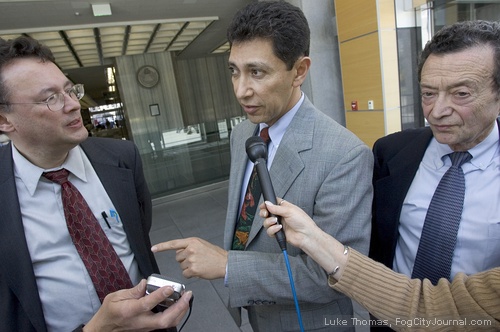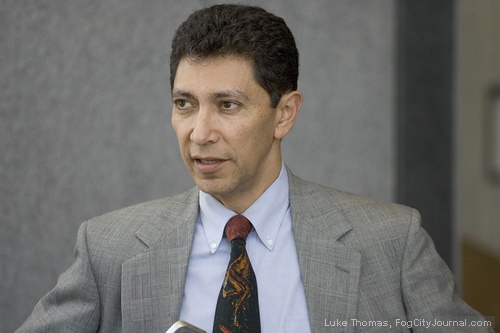
Attorneys Gordon Erspamer, Arturo Gonzalez, and Sid Wolinsky
– representing Veterans for Common Sense and Veterans United for Truth –
discuss their lawsuit against the U.S. Department of Veterans Affairs with reporters
following a two week trial in San Francisco. The groups are seeking an injunction
to compel the US government to provide the necessary and timely care needed
to prevent an alarming increase of suicides among veterans returning from conflict.
Photos by Luke Thomas
By Ari Burack
April 30, 2008
A federal court judge in San Francisco today heard closing arguments from lawyers disputing whether the U.S. Department of Veterans Affairs is providing adequate care for veterans with stress disorders, and whether the judge has the jurisdiction to order reforms.
“Your honor, these veterans need help,” Arturo Gonzalez, an attorney representing the two veterans groups in the case, told U.S. District Judge Samuel Conti this afternoon at the conclusion of the 10-day trial. “The VA has demonstrated that they won’t do it on their own,” he said.
Gonzalez contended today that veterans, including those returning from Iraq and Afghanistan, “are committing suicide at alarming rates.”
In his response, U.S. Department of Justice attorney Daniel Bensing, said the veterans groups’ claims about inadequate care were “extreme and outrageous” and not borne out by the evidence presented in the trial, which he referred to as “anecdotes and random, unconnected cases.”
“They have to prove a systemic case, and they have not done that,” Bensing told Conti.
He did acknowledge veteran suicides as a “major, serious problem” that needed to be addressed, he said.
Attorneys for Veterans for Common Sense and for Veterans United for Truth are seeking a broad injunction requiring improvements in mental health services and claims procedures at the VA.
Conti will likely issue a written ruling in the coming weeks.
Gonzalez said today that on average, 18 veterans commit suicide each day, and 1,000 attempt suicide each month. Those numbers, he added, are only tallied from those seeking care at the VA, and don’t include those that are homeless.
“More veterans are dieing in the US that in Iraq,” Gonzalez said.
Gonzalez said most VA facilities don’t have plans for dealing with veterans returning from Iraq and Afghanistan, and that those coping with post traumatic stress disorder are not being given the immediate attention they need, often being made to wait more than 30 days for referral to a specialist, he said.
Hundreds of thousands of other veterans are waiting for medical claims to go through, he said, and with an appeals process that can take years, some are dying while their appeals are pending, he said.
“The system, your honor, has crashed,” Gonzalez said. “It’s been overwhelmed.”
“And the pattern of neglect continues,” he said.

Arturo Gonzalez
The veterans groups are asking the judge to order the VA to fully implement its own mental health strategic plan; to comply with an internal VA memo delineating “specific programs intended to stop the suicides”; and to shorten claim times.
Bensing contended that “extensive care is provided” by the VA, which he said has a “substantial” $40 billion budget, $3.5 billion of which goes to mental health care, he said.
He said the agency now employs about 17,000 mental health professionals and is working to improve its programs. He said the agency already has regular suicide screening, post traumatic stress disorder professionals at each site, a suicide prevention plan and a suicide hotline.
Bensing attributed claims delays to an overall increase in claims, due to aging Vietnam veterans, more outreach by the VA, and congressional legislation that has expanded claim eligibility.
He denied that veterans were routinely turned away from treatment and said the VA is doing “whatever it can” to bring down wait times for claims. He said veterans of Iraq and Afghanistan, as well as veterans who are terminally ill or homeless, receive “expedited treatment.”
Bensing also contended that the VA’s mental health strategic plan had already been 80 percent implemented, a claim Gonzalez referred to after the hearing as “nonsense.”
“There’s no evidence of that,” Gonzalez said. “It cannot be all done immediately, as the plaintiff contends,” Bensing stated. “It is a process.”
Even with further funding expected from Congress, “We cannot work miracles,” Bensing said, adding “we anticipate making substantial progress.”
Bensing further argued that this court did not have the jurisdiction to issue an injunction. He said that issue would be better suited to the Federal Circuit court in Washington, D.C.
“They should go to Congress with these concerns,” he suggested.
Attorney Heather Moser, another member of the veterans group team, said outside the courtroom that she felt Conti did have the jurisdiction to issue an injunction, acknowledging that even if he did rule in their favor, an appeal would be likely.
According to Moser, the Federal Circuit court in Washington, D.C. normally decides cases involving federal regulations.
“We’re not saying ‘x’ regulation is unconstitutional; we’re saying that the system is broken,” Moser said.
She said both her law firm and the co-counsel in the case took up the case pro-bono.
“This is just something good that we’re trying to give back to the community, because we think it’s important,” said Moser. “This case isn’t about money, it’s about effectuating change.”
Conti has asked lawyers for the plaintiffs to submit briefs proposing a “tentative order” to him by May 9, and a response from the government by May 19, after which he will consider his ruling.


 The Hunger Site
The Hunger Site
No Comments
Comments for Attorneys Present Final Arguments
in Veterans’ Neglect Federal Case are now closed.